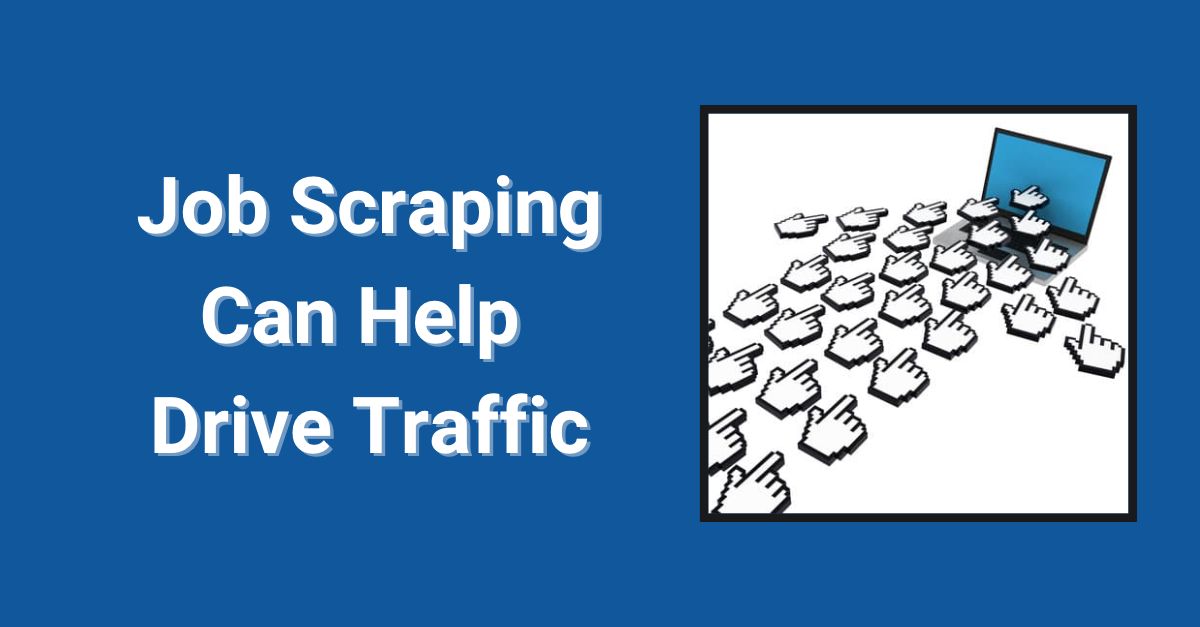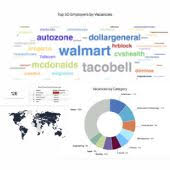
Why the Big Job Boards Use Job Scraping to Drive Traffic
What do Indeed, ZipRecruiter, Monster, Dice, and the other giants of the job board industry have in common? One thing is that they all rely on job scraping to drive traffic to their job boards.
In other words, they invest time and / or money into pulling job listings from the web and featuring them on their boards – a very different proposition from paid job feeds, which compensate the job board operator for listing jobs.
Why would a job board pay for organic jobs content when they could get paid to feature listings from an aggregator? Two reasons: user experience and lead loss. We’ll address both of them below, lay out why industry leaders love scraping (more traffic is just the beginning), and explain how smaller job boards can tap into the power of scraping to drive better results.
Direct Scraping vs. Indirect Scraping (aka Job Feeds vs. Organic Backfill)
There are two primary ways big job boards use job scraping:
Direct scraping, where they scrape (or pay someone to scrape) jobs from individual employer sites and ATSes. This is a targeted way to pull jobs from a company’s career site onto a job board. Job boards may scrape the career pages of their customers (i.e., those paying them to list jobs) and from non-customers. We’ll get to why in a minute.
Organic backfill, where they pay for a collection of scraped jobs from around the web. With our JobsIndex, for example, job boards can get access to millions of jobs or to specific segments (e.g., by industry, region, experience level, etc.).
So why drive traffic via scraped jobs rather than paid feeds? For two reasons:
- Remarket to job seekers. This is a crucial differentiator for scraping vs. paid feeds. When a job board features organic listings, job seekers have to register with them to apply, which means the job board can remarket to them and coax them back to the site again and again. Paid feeds send applicants away, meaning all the resources the job board put into attracting the applicant yielded only a few cents they got to list the feed or drive the application.
- Better customer experience. Both scraping and paid feeds increase the odds that job seekers will find a job they want. But paid feeds might bounce them around multiple platforms before they can actually submit an application, which can be confusing and disorienting. Organic listings keep applicants on your site or the career page of the employer – a much better experience, and one more likely to inspire repeat visits.
But as we hinted, increased traffic isn’t the only benefit of job scraping (which is why the big job boards love it so much). Let’s look at six other ways job scraping benefits job boards.
Other Benefits of Job Scraping
1. Accuracy
Because web scrapes pull data from ATSes and employer sites in something close to real time, they prevent errors in job listings. When an employer takes down the listing, and the listing disappears from the job board. This improves the job seeker experience because it eliminates the problem of expired jobs being listed.
2. Speed
It would be impossible to manually update job board listings at any kind of scale, and with paid feeds, you’re dependent on the aggregator for timely updates. Job scrapes pull data in an automated way, which means changes on an employer site automatically flow to the job board.
True, scrapes have to be maintained to function properly. But scrape maintenance is still far less work than attempting to maintain listings manually would be.
3. Customizability
Job scrapes pull data from job listings, not the listings themselves. This means the job board can reorganize and reformat that data however it wants to highlight the attributes most important to its users (e.g., remote vs. in-person work, salary, experience requirements, etc.).
4. User experience
We touched on this briefly before, but user experience is a big deal. Job boards with more listings are more helpful to job seekers. Job boards that don’t bounce applicants all around the web when they hit “apply” are helpful. Job boards that send job seekers relevant listings are helpful.
Job scraping and organic backfill make all of these things possible.
5. Cost effectiveness
Whereas paid feeds deliver a nominal source of revenue in the short term, investing in scrapes and organic jobs content lets you do the long-term work of building a loyal customer base, which is essential to sustaining growth.
6. Bonus: Google for Jobs traffic
Having more listings in and of itself will help drive traffic to your job board. If you work with a provider that can help you optimize your listings for Google For Jobs, you’ll likely win additional traffic. WebSpiderMount does that – contact us for details.
Drive More Traffic with Job Scraping
In many ways, the Field of Dreams slogan applies to job scraping: if you build it (job boards powered by scraping and organic backfill), they (job seekers) will come.
If you’re interested in driving more traffic to your job board but don’t have the bandwidth to maintain any more scrapes internally, get in touch. We’d be happy to tell you all about our custom scraping services and the ways JobsIndex can provide you with organic jobs content.
